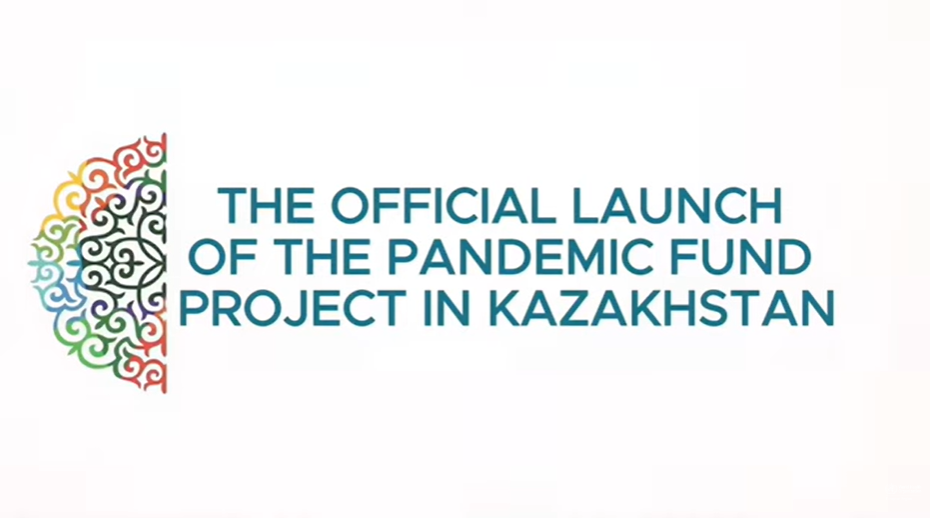 Strengthening the National Capacity for Pandemic Preparedness and Response to Infectious Disease Outbreaks
Strengthening the National Capacity for Pandemic Preparedness and Response to Infectious Disease Outbreaks
Background
The COVID-19 pandemic emphasized the necessity in Kazakhstan to enhance all core capacities of International Health Regulations to reduce the risks of future outbreaks. The country has not conducted a Joint External Evaluation (JEE) and its Performance of Veterinary Services (PVS) dates from 2007 but it does conduct State Party Self-Assessment Annual Reporting (SPAR). The Pandemic Fund grant of $19 million will address critical challenges in Kazakhstan’s public health system, particularly in epidemiological surveillance, border control (it shares extensive borders with China, Kyrgyz Republic, Russia, Turkmenistan and Uzbekistan), laboratory safety, early detection and response, and staff training. The grant will leverage an additional $5 million in co-financing and $34 million in co-investments. The Strengthening the National Capacity for Pandemic Preparedness and Response to Infectious Disease Outbreaks Project brings together a collaboration across government ministries, partners, and civil society groups, led by the Ministry of Health (MOH). As the Project’s Implementing Entity (IE), WHO will work closely with MOH technical working groups to achieve the Project’s objectives, including the National Centre of Expertise (NCE) of the Committee of Sanitary and Epidemiological Control and the Scientific and Practical Center for Sanitary and Epidemiological Expertise and Monitoring (SPCSEEM). Grant activities will complement the more regionally-focused activities to be funded by the Pandemic Fund’s $27 million award for the multi-country Pandemic Preparedness and Response through a One Health Approach in Central Asia Project.
Project objectives
The Kazakhstan Project has three main objectives: (1) strengthening epidemiological surveillance, (2) laboratory systems, and (3) workforce for pandemic preparedness and response. The Project will work towards improving multiple indicators for the SPAR and the next PVS.
Implementation arrangements and key components
The MOH is responsible for overall project coordination, policy guidance, and resource allocation to ensure that the implementation of the project activities is in accordance with the country’s national health priorities. As the only IE, WHO will provide technical assistance to the activities while ensuring quality standards and reporting on progress. SPCSEEM will be responsible for leading the implementation of certain laboratory systems improvements and epidemiological surveillance activities with support from the International Organization for Migration (IOM) for points of entry.
The Project’s three core components and activities are described below.
- Strengthening epidemiological surveillance. This component supports the modernization of legal and regulatory frameworks to align with global standards. The current National Preparedness and Response Plan, which is focused on influenza, will be updated to be more comprehensive and to prepare the country for future pandemics. The component will establish sentinel surveillance for priority respiratory pathogens. It will establish mechanisms for exchanging surveillance information on zoonotic diseases across sectors through electronic systems and an interoperability platform. At points of entry, the component includes a baseline assessment that will identify gaps and will then address those gaps accordingly, such as with the developing of standard operating procedures, training, and equipment. Lastly, public awareness of vaccination topics, healthcare-associated infections, and antimicrobial resistance (AMR) will improve through the development of risk communication and community educational activities.
- Building laboratory strengthening. The activities are intended to establish an efficient specimen referral and transport system for priority disease specimens, develop and implement standard operating procedures for biosafety and biosecurity of laboratories, revise and update the relevant regulatory and legal frameworks, automatize laboratory processes, train laboratory staff on safe packaging and transportation, and upgrade infrastructure and equipment.
- Investing in workforce development. Given the challenging shortage of trained staff in surveillance, laboratory systems, early detection and response and border control, the training component will support building a pool of national trainers in specific areas who will then carry out cascade training in regions. Capacity building will also include full-scale exercises to test and evaluate public health emergency plans and procedures for outbreak preparedness and emergency response to high-threat infectious diseases, as well as to improve the speed and effectiveness of early detection and rapid response.
Expected outcomes
The strengthening of core capacities in epidemiological surveillance, laboratory systems, and early detection and response will improve the overall resilience and responsiveness of the health system to respond to health emergencies. The Project also lays the groundwork to incentivize additional and sustainable funding for pandemic PPR.
For general inquiries: the_pandemic_fund@worldbank.org
-
 RegionProject RegionsEurope & Central Asia
RegionProject RegionsEurope & Central Asia -
 CountryProject CountriesKazakhstan
CountryProject CountriesKazakhstan -
 Amount Approved (US$) $19,202,194
Amount Approved (US$) $19,202,194 -
 Total Co-financing
Total Co-financing
(in kind & in cash) (US$) $5,060,000 -
 Total Co-investment
Total Co-investment
(in kind & in cash) (US$) $34,013,007
Related Links
- WHO and the Pandemic Fund
-
Why is it so important to prepare for public health emergencies?
WHO | February 15, 2024


